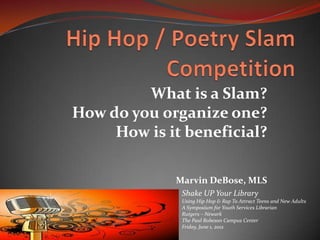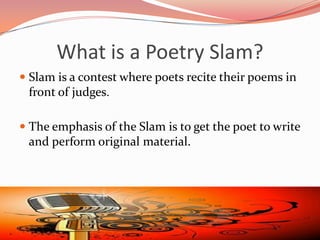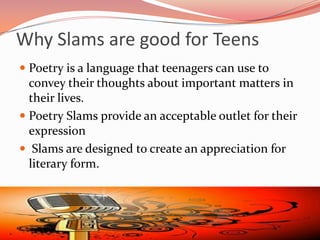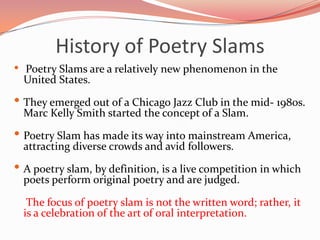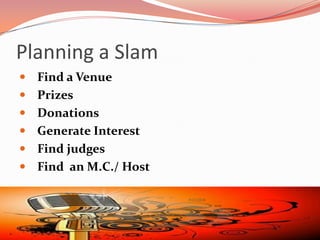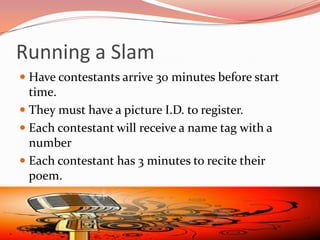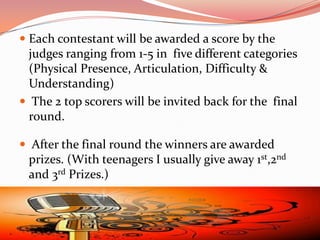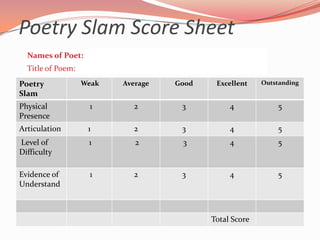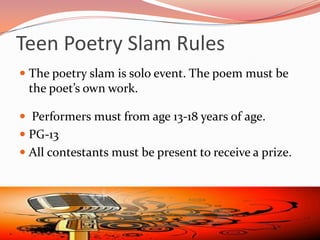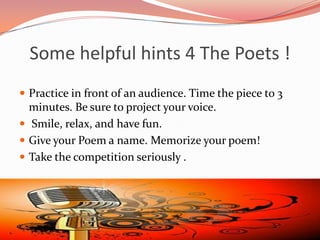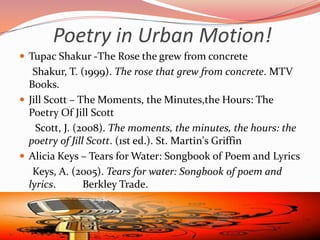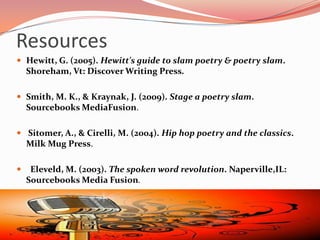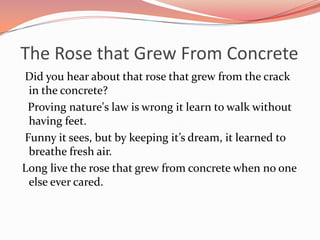Poetry slam with revisions2
- 1. What is a Slam? How do you organize one? How is it beneficial? Marvin DeBose, MLS Shake UP Your Library Using Hip Hop & Rap To Attract Teens and New Adults A Symposium for Youth Services Librarian Rutgers ŌĆō Newark The Paul Robeson Campus Center Friday, June 1, 2012
- 2. ’éŚ Poetry -A verbal composition designed to convey experiences, ideas, or emotions in a vivid and imaginative way, characterized by the use of language chosen for its sound and suggestive power . ’éŚ Hip Hop -the popular subculture of urban teenagers. Hip Hop is the most powerful cultural force on the globe right now ŌĆō Cornell West
- 3. What is a Poetry Slam? ’éŚ Slam is a contest where poets recite their poems in front of judges. ’éŚ The emphasis of the Slam is to get the poet to write and perform original material.
- 4. Why Slams are good for Teens ’éŚ Poetry is a language that teenagers can use to convey their thoughts about important matters in their lives. ’éŚ Poetry Slams provide an acceptable outlet for their expression ’éŚ Slams are designed to create an appreciation for literary form.
- 5. History of Poetry Slams ŌĆó Poetry Slams are a relatively new phenomenon in the United States. ŌĆó They emerged out of a Chicago Jazz Club in the mid- 1980s. Marc Kelly Smith started the concept of a Slam. ŌĆó Poetry Slam has made its way into mainstream America, attracting diverse crowds and avid followers. ŌĆó A poetry slam, by definition, is a live competition in which poets perform original poetry and are judged. The focus of poetry slam is not the written word; rather, it is a celebration of the art of oral interpretation.
- 6. Planning a Slam ’éŚ Find a Venue ’éŚ Prizes ’éŚ Donations ’éŚ Generate Interest ’éŚ Find judges ’éŚ Find an M.C./ Host
- 7. Running a Slam ’éŚ Have contestants arrive 30 minutes before start time. ’éŚ They must have a picture I.D. to register. ’éŚ Each contestant will receive a name tag with a number ’éŚ Each contestant has 3 minutes to recite their poem.
- 8. ’éŚ Each contestant will be awarded a score by the judges ranging from 1-5 in five different categories (Physical Presence, Articulation, Difficulty & Understanding) ’éŚ The 2 top scorers will be invited back for the final round. ’éŚ After the final round the winners are awarded prizes. (With teenagers I usually give away 1st,2nd and 3rd Prizes.)
- 9. Poetry Slam Score Sheet Names of Poet: Title of Poem: Poetry Weak Average Good Excellent Outstanding Slam Physical 1 2 3 4 5 Presence Articulation 1 2 3 4 5 Level of 1 2 3 4 5 Difficulty Evidence of 1 2 3 4 5 Understand Total Score
- 10. Teen Poetry Slam Rules ’éŚ The poetry slam is solo event. The poem must be the poetŌĆÖs own work. ’éŚ Performers must from age 13ŌĆÉ18 years of age. ’éŚ PG-13 ’éŚ All contestants must be present to receive a prize.
- 11. Some helpful hints 4 The Poets ! ’éŚ Practice in front of an audience. Time the piece to 3 minutes. Be sure to project your voice. ’éŚ Smile, relax, and have fun. ’éŚ Give your Poem a name. Memorize your poem! ’éŚ Take the competition seriously .
- 12. Poetry in Urban Motion! ’éŚ Tupac Shakur -The Rose the grew from concrete Shakur, T. (1999). The rose that grew from concrete. MTV Books. ’éŚ Jill Scott ŌĆō The Moments, the Minutes,the Hours: The Poetry Of Jill Scott Scott, J. (2008). The moments, the minutes, the hours: the poetry of Jill Scott. (1st ed.). St. Martin's Griffin ’éŚ Alicia Keys ŌĆō Tears for Water: Songbook of Poem and Lyrics Keys, A. (2005). Tears for water: Songbook of poem and lyrics. Berkley Trade.
- 13. Web Resources ’éŚ Slampapi http://marckellysmith.com/ ’éŚ Poetry Slam, Inc. http://www.poetryslam.com/ 13 ’éŚ Youth Speaks . http://youthspeaks.org ’éŚ Slamnation http://www.slamnation.com
- 14. Resources ’éŚ Hewitt, G. (2005). Hewitt's guide to slam poetry & poetry slam. Shoreham, Vt: Discover Writing Press. ’éŚ Smith, M. K., & Kraynak, J. (2009). Stage a poetry slam. Sourcebooks MediaFusion. ’éŚ Sitomer, A., & Cirelli, M. (2004). Hip hop poetry and the classics. Milk Mug Press. ’éŚ Eleveld, M. (2003). The spoken word revolution. Naperville,IL: Sourcebooks Media Fusion.
- 15. The Rose that Grew From Concrete Did you hear about that rose that grew from the crack in the concrete? Proving nature's law is wrong it learn to walk without having feet. Funny it sees, but by keeping itŌĆÖs dream, it learned to breathe fresh air. Long live the rose that grew from concrete when no one else ever cared.

